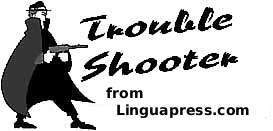
Explaining the everyday words and grammar points in English that can cause most confusion
The word enough in English
Meanings and usage
Enough is a word that signifies a sufficient quantity or a sufficient degree. It can be used either as an adjective, or as a pronoun, or as an adverb..The different uses of enough
| Index : | Enough as an adjective | Enough as a pronoun | Enough
as an adverb |
The essential rules
Enough
can be....
- Either - A quantifying adjective placed before a noun
- Or - An adverb placed after the adjective it qualifies
- Or - A pronoun standing on its own
Enough as an adjective.
Used as a quantifier adjective, enough is not really a problem word. However it can only be used as an attributive adjective (one that stands before the noun it qualifies); it cannot be used as a predicative adjective (after the verb to be or similar verbs). When enough stands alone following the verb to be, or other verbs, it is being used as a pronoun. See below.Enough can qualify count nouns in the plural, or non count nouns (which are by definition in the singular). Enough cannot normally be used to qualify a count noun in the singular.
Gradation of enough
The word enough, whether as adjective or as a pronoun, or as an adverb, can be qualified by certain adverbs of degree, in particular quite or hardly, and by certain other adverbs.Examples :
Have
you got enough money for the train ticket?
I think we have enough chairs for everyone to sit on.
With enough helpers, we'll be able finish this by this evening.
There was enough food to feed an army.
We have quite enough work to keep us busy until midnight !
We have more than enough work to keep us busy all day !
There's hardly enough room for everyone in this meeting.
I think we have enough chairs for everyone to sit on.
With enough helpers, we'll be able finish this by this evening.
There was enough food to feed an army.
We have quite enough work to keep us busy until midnight !
We have more than enough work to keep us busy all day !
There's hardly enough room for everyone in this meeting.
Enough as a pronoun
When enough stands on its own – for example when it is used predicatively after the verb to be – it functions as an indefinite pronoun. It means enough things or enough peopleExamples :
I
think you've said enough.
I think you've said quite enough.
Enough is enough.
Enough were against the project for it to be rejected.
Do you want some more ice-cream, or have you had enough ?
I think you've said quite enough.
Enough is enough.
Enough were against the project for it to be rejected.
Do you want some more ice-cream, or have you had enough ?
Enough as an adverb
This is where learners of English need to take care. Enough is an adverb of degree that can qualify adjectives or other adverbs, normally in predicative position (after to be, etc;) ; it cannot qualify verbs. And unlike almost all other adverbs that qualify adjectives or adverbs, enough follows the word that it qualifies; it never precedes it.When enough in this case is modified by hardly or by quite, this adverb of degree stands before the adjective or adverb,
i.e. {quite + adjective/adverb + enough} or {hardly + adjective/adverb + enough}.
Examples :
The essential rule is to remember not to confuse the usage of enough as an adjective,
precedeing a noun, with enough
as an adverb
which follows an adjective or another adverb.Qualifying a
predicative adjective
Qualifying an adverb
These
results are just not good enough !
Is the room warm enough for you, Madam ?
Yes, it's quite warm enough / No it's hardly warm enough !
My jeans don't seem big enough any more... They must have shrunk !
The man was old enough to be my grandfather.
Qualifying an attributive
adjective (Enough
is used with an attributive adjective
in some common expressions, and
also in colloquial spoken English,
but not too commonly in other
situations)Is the room warm enough for you, Madam ?
Yes, it's quite warm enough / No it's hardly warm enough !
My jeans don't seem big enough any more... They must have shrunk !
The man was old enough to be my grandfather.
That
was a good enough answer
(This
is a
common expression)
That was a quite good enough answer. (unusual but acceptable)
You'll get there on time if you take a fast enough train. (colloquial).
There was a serious enough incident for the police to be called. (Possible, but improbable)
Alternatives : The incident was serious enough for the police to be called.
or There was a sufficiently serious incident for the police to be called.
That was a quite good enough answer. (unusual but acceptable)
You'll get there on time if you take a fast enough train. (colloquial).
There was a serious enough incident for the police to be called. (Possible, but improbable)
Alternatives : The incident was serious enough for the police to be called.
or There was a sufficiently serious incident for the police to be called.
Qualifying an adverb
Luckily
enough we were able to get a ticket for the show..
If you work quickly enough, you'll be able to make two of them by lunchtime.
Funnily enough, I heard the same story.
The children were all walking happily enough until it started to rain.
If you work quickly enough, you'll be able to make two of them by lunchtime.
Funnily enough, I heard the same story.
The children were all walking happily enough until it started to rain.
Copyright : Website and texts © Linguapress.com except where otherwise indicated
Return to Linguapress home page



 Copyright
information.
Copyright
information.